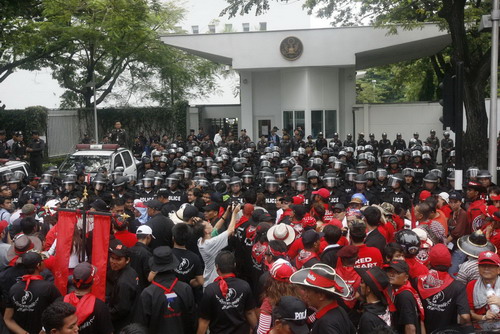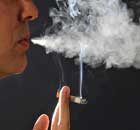Asia-Pacific
Thai protesters seek reinforcements for rally
(Agencies)
Updated: 2010-03-18 15:11
 |
Large Medium Small |
|
 Riot policemen stand guard while supporters of former Premier Thaksin Shinawatra gather outside the US embassy in Bangkok March 17, 2010. [Agencies] |
BANGKOK - Thai "red shirt" protesters vowed to prolong their mass anti-government rally in Bangkok on Thursday, despite doubts that the mainly rural movement has the ability to carry it off.
The United Front for Democracy Against Dictatorship (UDD), which is demanding new elections, planned to drum up support in the capital and the provinces to reinforce a rally that was showing signs of fizzling out after four days.
"We will have pick-up trucks and motorcycles going out all over Bangkok to urge people who agree with us that this government is illegitimate to come out," a UDD leader Nattawut Saikua told reporters.
Although the number of protesters has dwindled from its peak of over 150,000 on Sunday, tens of thousands remain, which is still large for a political protest in Thailand.
Investors have been emboldened by the lack of violence so far and the view that Prime Minister Abhisit Vejjajiva would ride out the storm. Economists say the central bank will likely bring forward an expected interest rate rise that could have been delayed by unrest.
Thai stocks were in positive territory for a seventh straight session on Thursday, trading at 19-month highs, when the baht currency reached its strongest level in 22 months.
"The market has had a strong run because of the non-violent political event," said Kiatkong Decho, an analyst at Sicco Securities.
The red-shirted supporters of ousted former premier Thaksin Shinawatra emptied bottles of their own blood outside Abhisit's residence on Wednesday in a symbolic sacrifice after the government rejected calls for elections.
Thaksin was ousted in a coup in 2006 and later sentenced in absentia to two years jail for graft. He now has Montenegrin citizenship and arrived there earlier this week, officials in the Balkan country said on Wednesday.
While Abhisit still maintains the backing of the military and a majority in parliament, the UDD insists it will keep up the protest to disrupt Bangkok and undermine the premier's leadership.
Roads were blocked in the historic heart of the city, both by protesters and the security forces, which stopped Abhisit, who has taken refuge in a military base, going to his office and attending a parliamentary session.
Analysts said the movement has many leaders who are playing different cards. On one hand, the UDD is urging civil disobedience but another faction, which key leaders have distanced themselves from, is calling for more extreme measures.
"It's a multi-pronged struggle and it's hard to predict which way it is going to go and whose plan is going to prevail," said Sukhum Nuansakun, an independent analyst.
"Rhetoric and reality don't always match. They talk about keeping this going for a long period. Next, they say it will end in four days or seven days to keep the crowd motivated."
Sukhum said a long-term street rally requires a higher level of grassroot organisation in terms of financing, supply and transportation.
Others analysts say a prolonged protest can undermine the government but may not topple it, noting that a street movement without an intervention by the military or the judiciary has hardly ever brought change in Thai politics.











